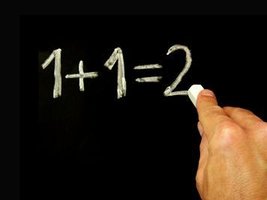 Just because your child doesn’t easily makes sense of math now, doesn’t mean he’s doomed to fail as a future number cruncher. There are plenty of kids, who struggle with addition, subtraction, multiplication and division in their early years, and then something finally clicks, and they end up as successful accountants or actuaries.
Just because your child doesn’t easily makes sense of math now, doesn’t mean he’s doomed to fail as a future number cruncher. There are plenty of kids, who struggle with addition, subtraction, multiplication and division in their early years, and then something finally clicks, and they end up as successful accountants or actuaries.
To ensure that your homeschooled student achieves success in the world of mathematics, don’t rely solely on memorization. Having children memorize math facts without teaching them why the answer is correct often leads to future problems.
Kids will be much more receptive to learning math if you make the process fun. For example, if your child is struggling to grasp multiplication concepts, consider the following interactive solutions:
Dice: Utilize a cheap pair of dice to make learning multiplication fun for kids. In this game, a player rolls the dice and multiplies the numbers that appear on each piece, and then records the total on a sheet of paper. When Player One is done, he gives the dice to the next player, who takes his turn rolling and recording the results. Players continue taking turns until someone reaches 100 points. The first person to 100 wins. If you are playing with younger children, have them draw out the multiplication problem using circles and stars. For instance, if a student rolls a three and a four, have him draw three large circles with four stars inside. Next, have him count the stars in each circle to reveal the answer to 3 x 4.
Cards: A simple deck of playing cards can go a long way in getting your child to embrace multiplication. For this game, remove the face cards and just use the numbered cards. Next, divide the deck of cards evenly between two players and have them flip over the top card at the same time. The first player to correctly multiply the numbers displayed on the cards gets to keep them. The player with the most cards at the end of the game is the winner.

